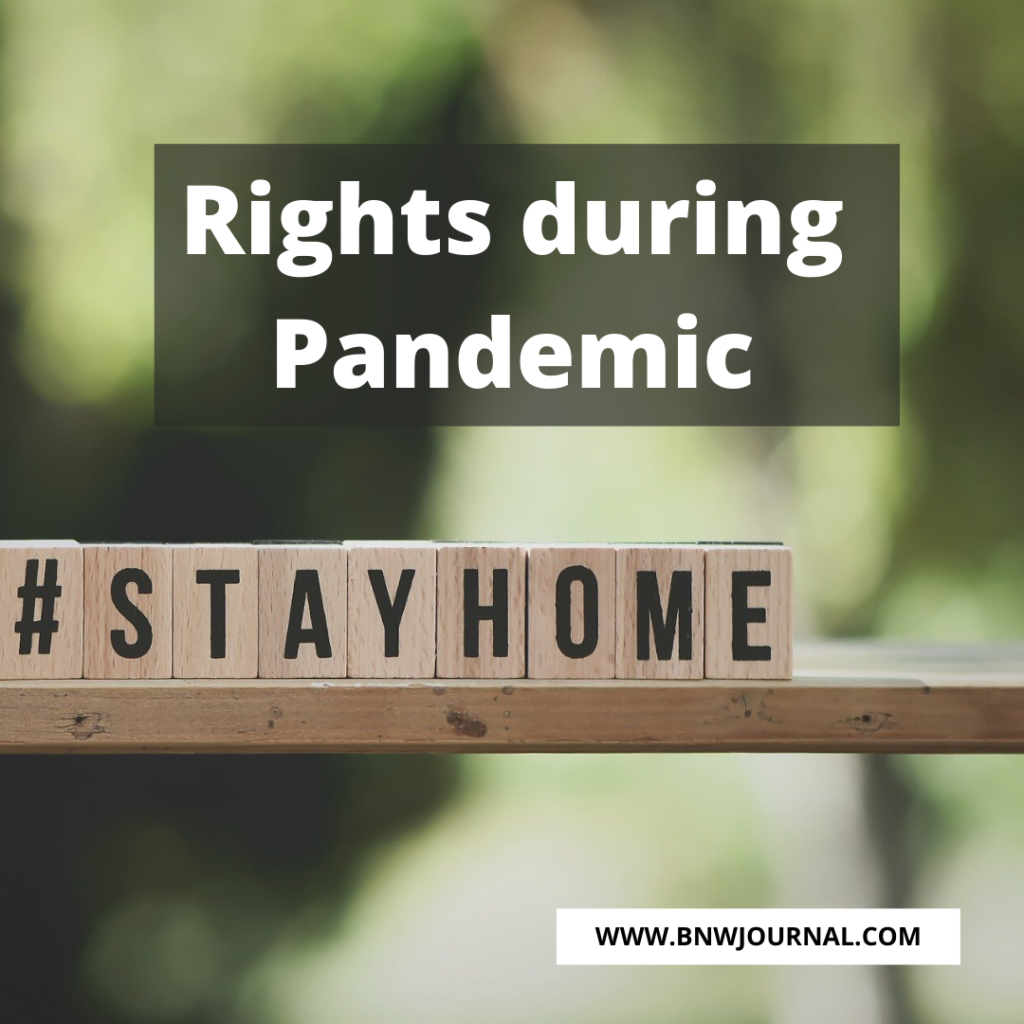![]()
From China to New York, the whole world is going through a global health emergency. In such an unprecedented crises priority is to save lives of people as is the duty of the state. Such an exceptional situation compels the state authorities to take extraordinary measures like extensive lockdowns.

However, every person has fundamental rights granted by the country which poses a challenge to every country. Many researches claimed that this public health crisis will lead to an economic and social crisis in the future.
The novel coronavirus does not discriminate between humans and human. But due to this pandemic, many discriminatory situations arise, like: lockdown limiting access to food, school, work, and basic services. Support for older persons, children, and people with disabilities has weakened. Women have to carry a disproportionate burden of care work which is directly impacting their rights.
Not only during lockdown but also the post lockdown impact seems not so good. Closing of schools interrupted the education of more than 1 billion children worldwide. Unemployment and food insecurity will arise in the future. Also the number of increasing domestic violence case will result in social insecurity.
India is fighting with the coronavirus to its best. We have also been appreciated by WHO and other countries for our efficiency to fight coronavirus. But still, the problem of protecting the rights of people remains the same as that of other countries.
In India, Article 21 of the Constitution of India gave the Right to Life or personal liberty to every person. In the case of Maneka Gandhi v. UOI, the court held that Article 21 couldn’t be overlooked even during emergencies. For open interpretation, SC read several Rights in Article 21 to make life more meaningful which included the Right to livelihood, Right to good health, Right to food, Right to education, Right to speedy trial, Right to women to be treated with decency and dignity, Right to privacy, Right to legal aid, Right to health and medical aid of workers, Right to economic empowerment, Right to decent burial or cremation, etc.
But the question here is, do people still have all these rights or this all is part of paper only?
The Public Distribution System (PDS) in India suffers from various drawbacks as is the case with system of government here. A prime example being how the migrants from various states fail to acquire BPL cards. In many states many ration card applications are pending e.g. In Jharkhand, 7 lakh applications are pending.
Due to a lack of PPE kits for health workers and corona fighters, the right to health becomes questionable for them. This also questioned the CERC judgment which held that, “the compelling necessity to work in an industry exposed to health hazards due to indigence to bread-winning for him and his dependents should not be at the cost of health and vigor of the workman.”
Between those who need and who avail the scheme of unemployment there is a large gap.
The employee state insurance scheme was only for the organized sector. Government provided help to construction workers but other informal sectors like roadside vendors etc. received no such luxury. Schemes are arbitrary and without any reasonable classification violating Article 14.
With Article 21, also comes RTE, but students’ education continued on even during the lockdown period. Most of the state government is advising of online education. But do all students have internet during this lockdown?Even all students are not having phones and laptops in India; not only students, the teachers of village schools are also not having proper access to the internet. In a developing country like India, the formula of online education is next to impossible.
The judgment of KS Punnuswamy v. UOI also held the Right to Privacy as a fundamental right under Article 21. Because of the Aarogya Setu app, violation of this particular right while tracking a person takes place. The results of this will be seen in months after lockdown. At the present moment though, the situation is unavoidable for the safety of the people.
State may increase the suspension of mid-day meal programs even after lockdown. In India, mid-day meals have a direct impact on the number of students enrolled in government schools.
The dropout rates will also increase after lockdown. Dropout rates are highest in minority communities due to socioeconomic issues. The post lockdown financial crises, unemployment, loss of family income will further increase this dropout rate.
The Bombay High Court however advised citizens that “citizens should remember fundamental duties, not just fundamental rights in Covid-19 pandemic.”
No country can beat this coronavirus alone. That’s why most of the countries are in lockdown nowadays.
After this crisis, sooner or later our nation and other countries of the world have to rethink fundamental rights during emergency circumstances.
The Indian Constitution is called a living document because it always grows; it’s again the time to grow it once more. Otherwise the people will lose faith in the judiciary and constitution. The fundamental rights are not the rights on paper. They are essential to the life of one individual. The SC added many rights under article 21 but are all these rights possible even in such a situation? If yes, then we have to think: how? We, the people of India have to think and grow as per the changing situations. We have to fight against coronavirus and also against changing situations.



0 Comments